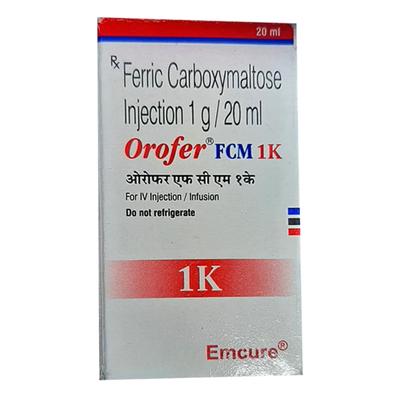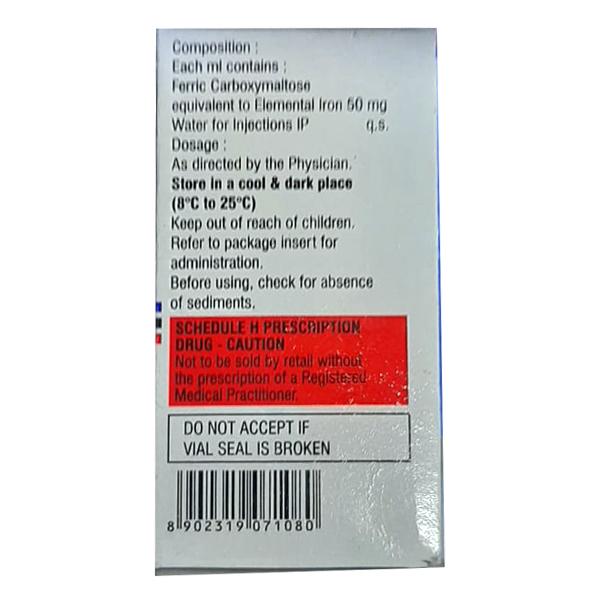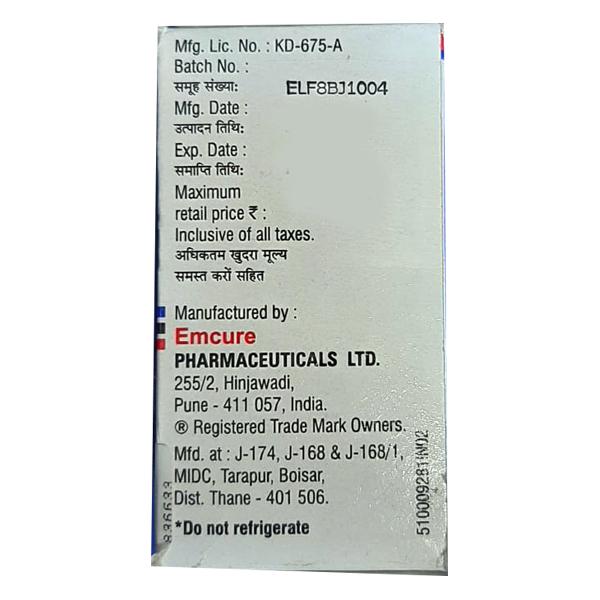

Netmeds First Membership
Quick Links
Introduction About OROFER FCM INJECTION
OROFER FCM INJECTION contains Ferric carboxymaltose, which belongs to the group of medicines called Iron replacement medicines. It is used to manage iron deficiency anaemia (IDA) in adults and in children (above 14 years of age) who are unable to take iron supplements orally, have an intolerance to oral iron supplements, need a rapid iron supplement in the body, or have non-dialysis-dependent chronic kidney disease.
Iron deficiency anaemia is a condition in which the body lacks enough amount of iron, which is essential for the production of red blood cells and transport of oxygen in the body.
Your doctor may advise you to take relevant tests to understand your existing condition. Before receiving OROFER FCM INJECTION, inform your doctor if you are pregnant, planning to get pregnant, or breastfeeding.
OROFER FCM INJECTION is not recommended for use in children and adolescents (under 14 years of age), and it should be used with caution in elderly patients (aged 65 years or above). Consult your doctor before receiving OROFER FCM INJECTION.
The most common side effects of receiving OROFER FCM INJECTION may include headache, dizziness, flushing, high blood pressure, nausea, and injection or infusion site reactions. Consult your physician if any of the symptoms worsen.
Uses Of OROFER FCM INJECTION
- Manages iron deficiency anaemia
How OROFER FCM INJECTION Works
OROFER FCM INJECTION contains iron (III) hydroxide complexed with a carbohydrate polymer called carboxymaltose, which is capable of releasing iron. The iron released from the complex helps in the synthesis of haemoglobin and increases red blood cell count. As a result, it manages iron deficiency anaemia.
How to use OROFER FCM INJECTION
OROFER FCM INJECTION will be given to you only by a doctor or a nurse into a vein as an intravenous injection or infusion. Your physician will decide the correct dose and duration for you depending upon your age, body weight, and severity of the condition.
Side Effects Of OROFER FCM INJECTION
Common
- Headache
- Dizziness
- Flushing
- High blood pressure
- Nausea
- Injection/infusion site reactions
- Low levels of phosphorous in the blood
Uncommon
- Numbness
- Prickling or tingling sensation of the skin
- Change in taste sensation
- Increased heart rate
- Low blood pressure
- Difficulty breathing
- Vomiting
- Indigestion
- Stomach pain
- Constipation
- Diarrhoea
- Itching
- Redness of the skin
- Skin rash
- Muscle or joint pain
- Back pain
- Pain in the arms or the legs
- Muscle spasms
- Fever
- Tiredness
- Chest pain
- Swelling of the hands and feet, and chills
Rare
- Inflammation of the vein
- General feeling of discomfort
- Anxiety
- Fainting or feeling faint
- Wheezing
- Flatulence
- Rapid swelling of the face, mouth, tongue, or throat, which may cause difficulty in breathing
- Paleness and discoloration of the skin in other areas of the body than the injected site
Contact your doctor immediately if you experience any of the following side effects:
- Symptoms of serious allergic reaction or Kounis syndrome (such as rashes, itching, swelling of the face, lips, mouth, tongue, throat, or body causing difficulty in breathing or wheezing and chest pain)
- Severe or life-threatening allergic reactions called anaphylactic reactions, which can be associated with heart problems, circulation problems (low blood pressure), and loss of consciousness
- Sign of a decrease in blood phosphorus causing softening of bones (osteomalacia). Symptoms include worsening of tiredness, muscle or bone pain (pain in arms or legs, joints, or back), and may lead to fractures
- Signs of high blood pressure (such as facial flushing, dizziness, or nausea)
- Skin irritation and brownish discolouration of the skin at the injected site
How To Manage Side Effects
Constipation
Take fiber-rich foods in your diet, such as fresh fruits, vegetables, and whole-grain cereals, and drink plenty of fluids. Consult your doctor if the constipation does not improve.
Diarrhea
Drink lots of fluids, such as water or fruit juices, to keep yourself hydrated. Avoid eating high-fat or spicy foods. If the diarrhea does not improve, consult your doctor.
Headache
Take a rest and relax. Drink plenty of fluids, such as water. Apply a pain-relieving balm on the forehead if necessary. Consult your doctor if your headache does not improve.
Nausea And Vomiting
Stick to simple meals. Avoid eating oily, fried, or spicy foods. Do not lie down or sleep immediately after eating. Consult your doctor if nausea and vomiting do not improve.
Stomach Pain
Try to take a rest and relax. Eat and drink slowly, or try to have smaller and more frequent meals. Keep a heat pad on your stomach. If the stomach pain does not improve, consult your doctor.
Warning & Precautions
Pregnancy
Monitoring requiredOROFER FCM INJECTION should be used with caution in pregnant women only if considered clearly necessary. Inform your doctor if you are pregnant, think you may be pregnant, or are planning to have a baby. Consult your doctor before receiving OROFER FCM INJECTION.
Breastfeeding
Consult your doctorIf you are breastfeeding, consult your doctor for advice before receiving OROFER FCM INJECTION. It is unlikely that OROFER FCM INJECTION represents a risk to the breastfed child.
Driving and Using Machines
SafeOROFER FCM INJECTION is unlikely to impair the ability to drive or operate machines.
Kidney
Use with CautionOROFER FCM INJECTION should be used with caution in patients with chronic kidney disease who are dependent on haemodialysis management. Consult your doctor before receiving OROFER FCM INJECTION.
Liver
Use with CautionOROFER FCM INJECTION should be used with caution in patients with liver disease. Consult your doctor before receiving OROFER FCM INJECTION.
Allergy
ContraindicatedDo not receive OROFER FCM INJECTION if you are allergic to ferric carboxymaltose or any of the other ingredients of this medicine or if you have experienced serious allergic reactions to other injectable iron preparations.
Lungs
Use with CautionOROFER FCM INJECTION should be used with caution in patients with severe asthma. Consult your doctor before receiving OROFER FCM INJECTION.
Use In Pediatrics
ContraindicatedOROFER FCM INJECTION is not recommended for use in children (under 14 years of age). Consult the child's doctor for advice on how to manage the condition.
Use In Geriatrics
Use with CautionOROFER FCM INJECTION should be used with caution in elderly patients (aged 65 years or above). Consult your doctor before receiving OROFER FCM INJECTION.
Others
OROFER FCM INJECTION is not recommended for use if you have:
- Anaemia not caused by iron deficiency
- Iron overload (too much iron in your body) or disturbances in the utilization of iron
Before receiving OROFER FCM INJECTION, inform your doctor if you have:
- Systemic lupus erythematosus
- Rheumatoid arthritis
- Eczema or other allergies
- An infection
- Low levels of phosphate in the blood
- High blood pressure
Interactions
A. Drug-Drug interactions:
Before receiving OROFER FCM INJECTION, inform your doctor if you are using or have recently taken any other medicines, including prescription and non-prescription medicines and vitamins or herbal supplements.
- Oral iron preparations such as ferrous ascorbate, ferrous sulphate, ferric citrate (used to manage low levels of iron in the body)
Overdosage:
OROFER FCM INJECTION will be administered to you only by a doctor or a nurse in a hospital, and so it is unlikely to receive an overdose. However, consult your doctor or nurse if you experience any unusual symptoms.
Synopsis
| Drug | : | Ferric carboxymaltose |
| Pharmacological Category | : | Iron replacement medicines |
| Therapeutic Indication | : | Iron Deficiency Anemia (IDA) |
| Dosage Forms | : | Injection |
More Information
Storage
- Keep OROFER FCM INJECTION out of reach of children
- Store at room temperature
FAQs About OROFER FCM INJECTION
Q: What is the use of OROFER FCM INJECTION?
A: OROFER FCM INJECTION is used to correct iron deficiency anaemia (IDA) in adults and in children (above 14 years of age).
Q: How long does it take for OROFER FCM INJECTION to improve hemoglobin levels?
A: It takes a few weeks for OROFER FCM INJECTION to improve your hemoglobin levels, but some people may notice an improvement in their symptoms within a few days.
Q: How does OROFER FCM INJECTION work?
A: OROFER FCM INJECTION contains iron (III) hydroxide complexed with a carbohydrate polymer called carboxymaltose, which is capable of releasing iron. The iron released from the complex helps in the synthesis of haemoglobin and increases red blood cell count. As a result, it manages iron deficiency anaemia.
Q: Is OROFER FCM INJECTION safe to use in patients with liver problems?
A: OROFER FCM INJECTION should be used with caution in patients with liver disease. Consult your doctor before receiving it.
Q: What are the common side effects of OROFER FCM INJECTION?
A: The most common side effects of using OROFER FCM INJECTION may include headache, dizziness, flushing, high blood pressure, nausea, and injection or infusion site reactions. Consult your physician if any of the symptoms worsen.
Q: Is OROFER FCM INJECTION safe to use in patients with kidney problems?
A: OROFER FCM INJECTION should be used with caution in patients with chronic kidney disease who are dependent on haemodialysis management. Consult your doctor before receiving OROFER FCM INJECTION.
Q: Who should avoid receiving OROFER FCM INJECTION?
A: OROFER FCM INJECTION is not recommended for use in patients with evidence of iron overload or disturbances in the utilization of iron, anaemia not attributed to iron deficiency (microcytic anaemia) and with known allergies to ferric carboxymaltose or serious allergies to other parenteral iron products.
Q: Is OROFER FCM INJECTION safe to use in elderly patients?
A: OROFER FCM INJECTION should be used with caution in elderly patients (aged 65 years or above). Your doctor may monitor you carefully during administration and a certain time after administration of OROFER FCM INJECTION.
Q: Can OROFER FCM INJECTION be used during pregnancy?
A: OROFER FCM INJECTION should be used with caution in pregnant women only if clearly advised by your doctor. Inform your doctor if you are pregnant, think you may be pregnant, or are planning to have a baby.
Q: Does OROFER FCM INJECTION affect my ability to drive?
A: OROFER FCM INJECTION is unlikely to impair the ability to drive or operate machines.
Q: Can OROFER FCM INJECTION cause nausea and vomiting?
A: Yes, OROFER FCM INJECTION causes nausea and vomiting. Stick to simple meals. Avoid eating oily, fried, or spicy foods. Do not lie down or sleep immediately after eating. Consult your doctor if the symptom does not improve.
Q: Is OROFER FCM INJECTION safe to use in patients with lung problems?
A: OROFER FCM INJECTION should be used with caution in patients with severe asthma. Consult your doctor before receiving.
Q: Can I take other medicines with OROFER FCM INJECTION?
A: Before using OROFER FCM INJECTION, inform your doctor if you are taking or have recently taken any other medicines, including medicines obtained without a prescription, vitamin supplements, or herbal products.
Q: Can OROFER FCM INJECTION cause an allergic reaction?
A: Yes, do not receive OROFER FCM INJECTION if you are allergic to ferric carboxymaltose or any of the other ingredients of this medicine or if you have experienced serious allergic reactions to other injectable iron preparations.
References
1. KD. Tripathi. Haematinics and Erythropoietin. Essentials of Medical Pharmacology. Seventh Edition. 2013. Page – 605
2. Joao Ricardo Friedrischa and Rodolfo Delfini Cancadob. Intravenous ferric carboxymaltose for the management of iron deficiency anemia. NIH. National Library of Medicine, National Center for Biotechnology Information. PMC PubMed Central. October 2015. [Accessed on 31st July 2024] https://www.ncbi.nlm.nih.gov/pmc/articles/PMC4678908/
3. American Regent, Inc. Safety and Tolerability of Ferric Carboxymaltose (FCM) Versus Standard of Care in treating Iron Deficiency Anemia. NIH. U.S. National Library of Medicine. ClinicalTrials.gov. [Revised in February 2018] [Accessed on 31st July 2024] https://clinicaltrials.gov/ct2/show/NCT00703937
4. Vifor France. Electronic Medicines Compendium (EMC). [Revised in November 2021] [Accessed on 31st July 2024] https://www.medicines.org.uk/emc/files/pil.5910.pdf
5. Vifor (International) Inc., U.S. Food & Drug Administration. [Revised in April 2021] [Accessed on 31st July 2024] https://www.accessdata.fda.gov/drugsatfda_docs/label/2021/203565s014lbl.pdf
Useful Diagnostic Tests
- Complete Blood Count (CBC)/ Hemogram
- Ferritin /Iron, Serum
- Iron Studies
- Iron Deficiency Profile
- Total Iron Binding Capacity- Tibc
- Unsaturated Iron Binding Capacity (Uibc)
- Ferritin
- Iron Studies With Ferritin










